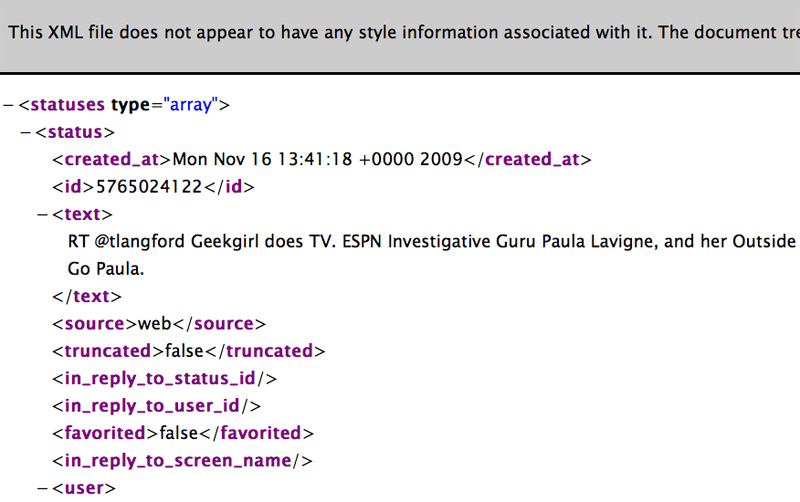On the Records: Your Turn to Make Word Clouds
/https://static.texastribune.org/media/images/tweet_lead_art.jpg)
Today we published "The GOP Primary in 140 Characters," a story about gubernatorial candidates and their dispatches on Twitter.
The piece centers on the word cloud, a method of visualizing text. Clouds increase the sizes of words, depending on how often they're used in a document or series of documents, in this case Twitter posts by candidates.
Making them is simple. To visualize a Twitter account, there's a URL that allows you to download tweets to XML format, which can then be imported as a spreadsheet into Microsoft Excel.
The URL: http://twitter.com/statuses/user_timeline/account.xml?count=n
To start, replace "account" with the Twitter user name, and "n" with the number of tweets you'd like to download. Hit enter/return, and you'll see an XML document like this in the browser:
Save that file to your computer, and then import it into Excel as a workbook. You'll see a spreadsheet style document with multiple fields containing information about each tweet, including ID, date, etc. Select the entire column of tweets, and copy the text to the clipboard.
Next, go to Wordle.net, and click "create". Paste the text into the form, and click "Go."
Once the Java applet renders, you'll have the option of changing the layout (horizontal, vertical, etc.), font and color (select one, or create your own palette). You can then take a screenshot, or print the cloud, or save it to Wordle's public gallery.
Here's one created from @TexasTribune's account:
And one from my @matt_stiles account:
These word clouds are visually interesting, sure, but also revealing. Clearly, those folks @TexasTribune like mentioning the state, but also the prominence of words "thanks", "founding" and "member" hint at the organization's nonprofit mission of trying to raise money to fund journalism. I, of course, am outed as a self-promoter who likes to re-tweet ("RT") others' content and use the word "just" just too much.
So, there's a lesson on word clouds. Let me know if you have questions. We'll republish cool examples here, too, if you send them.
[Hap tip to Akmal Wardak, who saved me from my previous Python option]
Texas Tribune donors or members may be quoted or mentioned in our stories, or may be the subject of them. For a complete list of contributors, click here.
Information about the authors
Learn about The Texas Tribune’s policies, including our partnership with The Trust Project to increase transparency in news.



/https://static.texastribune.org/media/profiles/TxTrib-Staff-MaycotteHO.jpg)
/https://static.texastribune.org/media/profiles/TxTrib-Staff_0016_StilesMatt800.jpg)